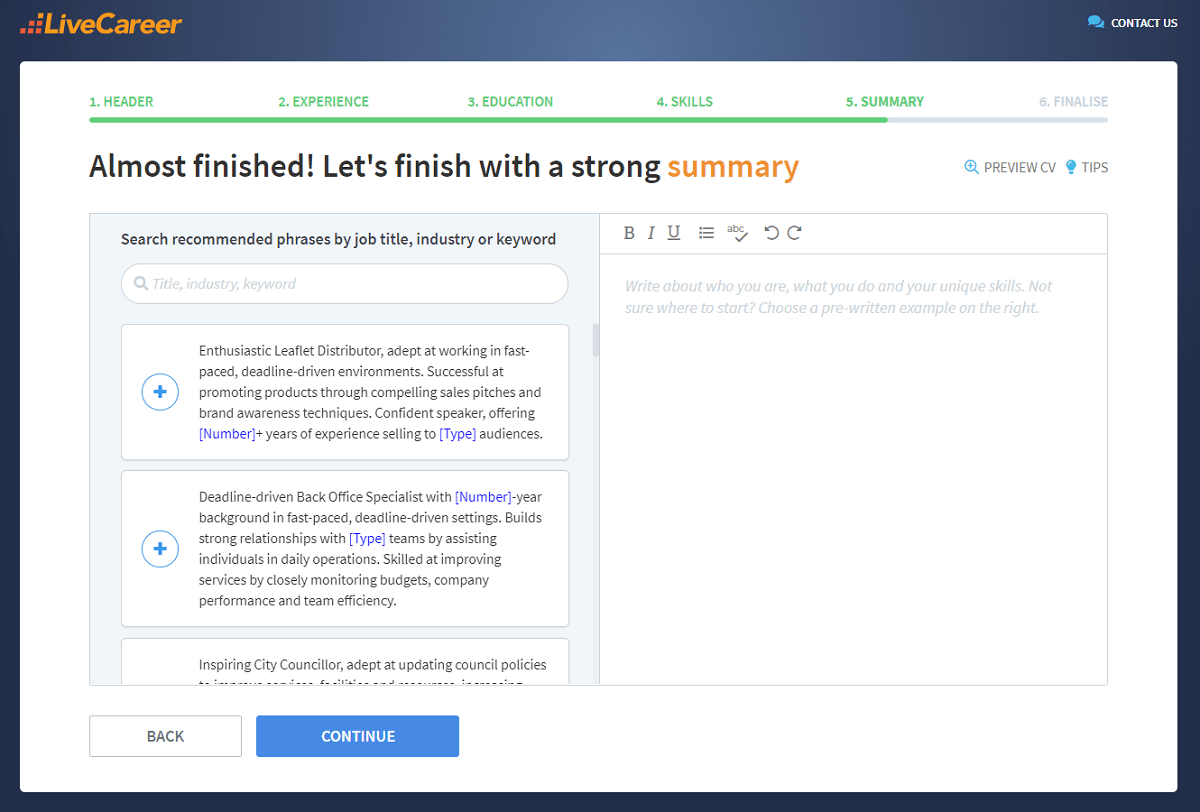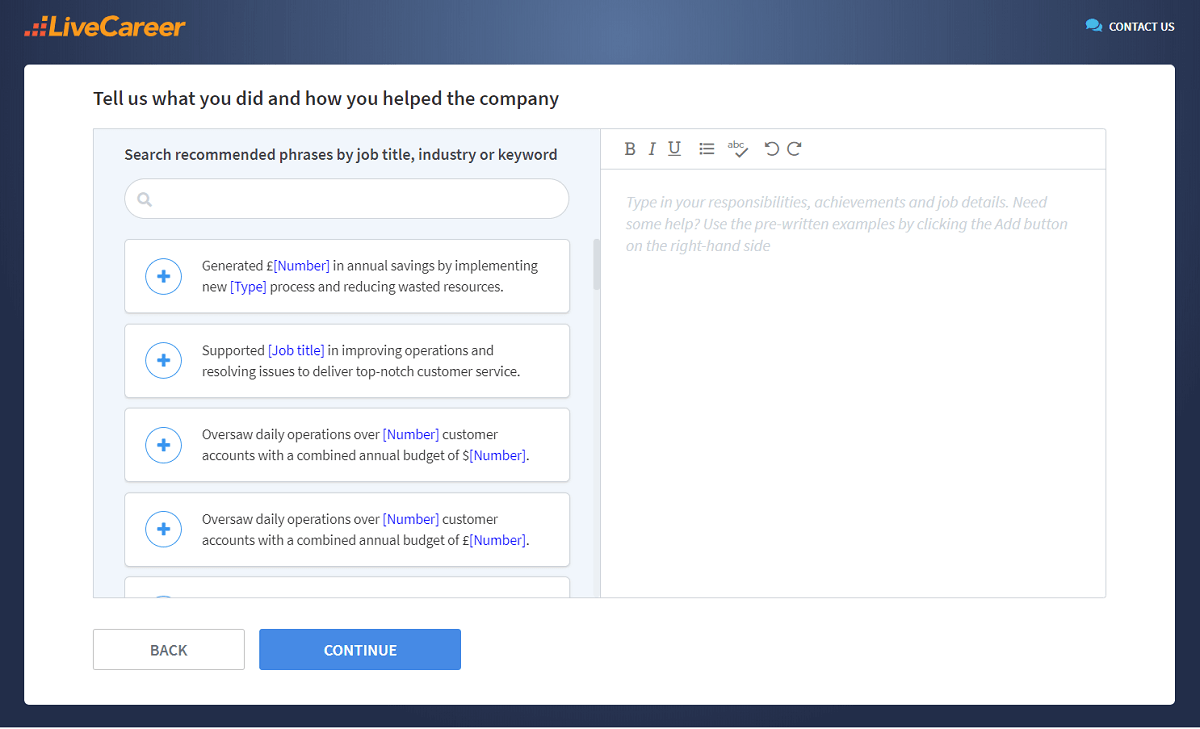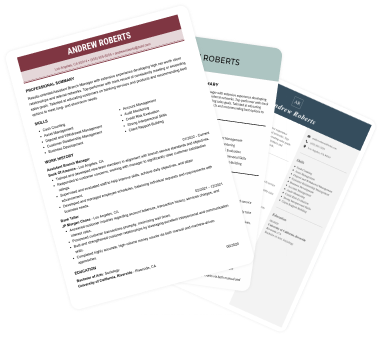Create a professional CV now!
 NO
NO YES
YESLast updated on 4 February, 2026

Our customers have been hired by*:
To put it briefly: a resume and a CV are not the same thing. In the UK and in Europe, a CV (curriculum vitae) is the standard job application document that presents the candidate's qualifications. However, it's a different case in the US: there, a resume is a tailored document most commonly used for non-academic positions, while a curriculum vitae refers to an in-depth overview of an academic or research career.
This article presents a detailed resume vs CV comparison, points out the differences between these two documents, and explains when and where you should use each type.
Create an effective CV in minutes. Choose a professional CV template and fill in every section of your CV in a flash using ready-made content and expert tips.
Create a professional CV now!
 NO
NO YES
YESWe created the sample on the left using our builder. See other good CV examples like this one.
Want to learn more about CV writing? Check these guides:
Jennifer Hunt
T: 077 3333 3333
E: jennifer.hunt@lcmail.co.uk
LinkedIn: linkedin.com/in/jenniferhunt
Reliable and highly motivated shop assistant with 4+ years’ experience in both food shops and clothing retail. Exceeded unofficial sales targets in current position 67% of the time (averaged over a period that encompasses social distancing measures). Sold 20% more stock when informing customers of discounts by strategically focusing on multi-item promotions. Looking for opportunity to make use of sales skills and technical know-how to create even more return customers for Davey Jones.
Work experience
Shop Assistant
Roderick and Gunn, Oxford
August 2018—present
Deli Assistant
Rowers’ Deli, Oxford
February 2016—August 2018
Education
NVQ 2 in Retail Operations, 2017
Jacob Denim College, Oxford
A-levels: Commerce, English, Travel and Tourism, 2013–2015
Moorhead High School, Oxford
8 GCSEs (including Mathematics and English), 2011–2013
Moorhead High School, Oxford
Skills
Hobbies
Awards
Is a resume a CV? And which one is correct in the UK: a CV or a resume?
When people say ‘CV’ in the UK, they mean essentially the same thing as people in the USA do when they say ‘resume’. In the UK, people don’t use the word resume at all, though. In the US, they use the words ‘Curriculum Vitae’ (CV) to mean something quite different than what people in the UK call by that name.
The US use of ‘CV’ corresponds with the UK academic use. People applying for an academic position in a university or other higher education institution generally submit a CV, whether in the UK or USA. A CV in this context is a significantly longer version of both the regular British CV and American resume.
And what is a CV in England, specifically? In the UK, a CV is a comprehensive document that provides a summary of a candidate's educational background, work experience, accomplishments, and professional skills. They're usually displayed in a chronological order, and take one page maximum.
A strong CV summary will convince the recruiter you’re the perfect candidate. Save time and choose a ready-made personal statement written by career experts and adjust it to your needs in the LiveCareer CV builder.

Is resume the same as CV? In the UK there is no difference between a CV and a resume. Both terms refer to the same thing, although ‘resume’ is not used at all in the UK. The term 'CV' is also popular in Ireland and New Zealand, as well as in Europe. In the USA there is a big difference between a resume and a CV: a resume is what would be called a CV in the UK and a CV is used only in academic contexts.
An academic CV (simply called a CV in the US) is very different from a regular CV in English or resume (US). It’s typically a far longer document with no page limit and includes many additional sections, like publications, conferences, fellowships, research grants, and so on. It’s used mainly for teaching and research jobs.
The word ‘resume’ is taken from the French résumé, the past participle of résumer, meaning ‘to summarise’. Whereas the term ‘curriculum vitae’ (CV) is simply Latin for ‘the course of one’s life’. This might suggest that a resume is a brief summary of your working life while a CV is more of an unfiltered account.
This rings truer for the US use of the terms resume and CV (where a CV [academic CV in the UK] is a longer, less filtered document than a resume). In the UK, though, a CV is no less a brief summary than a US resume. Both are tailored to a given job application and both focus on only the most relevant details.
On the UK side, there is Ireland, most European countries, and New Zealand. In these countries a relatively short summary of your education and career (what would be called a resume in the US) is called a CV. People applying for a university teaching and/or research position will typically submit an academic CV.
On the US side, there is mainly just Canada. Here the term CV is reserved for giving a fuller account of academic careers while regular job applications are handled with a resume. Aside from minor regional differences, a resume in these countries is the same as a CV in the UK.
Finally, there’s Australia, South Africa, and India. In these countries the terms CV and resume are used interchangeably and mean the same thing. Even though ‘CV’ and ‘resume’ mean the same thing, CVs are slightly more likely to be used for white-collar jobs and resumes for blue-collar and unskilled ones.
There are three main formats that either a CV or a resume can take:
In order to compare apples to apples, let’s focus on what is by far the most common one of these—the chronological format.
The format of a reverse-chronological CV (UK) and a reverse-chronological resume (US) can be identical and is at the very least extremely similar. Compare them for yourself:
|
CV (UK) |
Resume (US) |
|
|
|
|
|
|
|
|
|
|
|
|
A resume summary can end up being exactly the same as a personal statement, so the formats are potentially identical. Compare these with what is called an academic CV in the UK and simply a CV in the USA:
Academic CV (UK) / CV (US)
The difference is striking. An academic CV is a different thing altogether. The format isn’t as fixed as a regular CV (or resume). The other major difference is that an academic CV isn’t a summary, it’s a complete account of an academic’s working life. You tailor your CV to each job but not your academic CV.
Generally, use the document-naming and other conventions of the country in which you’re applying for the job. So:
When applying for a university post, use an academic CV in either country unless asked for something different. The title of an academic CV is going to be ‘Curriculum Vitae’ regardless of whether you’re in the UK or US.
Whatever it’s called and wherever you’re submitting it, your CV is only part of your job application. A complete job application includes at least a cover letter and a perfectly written CV, in that order. Some employers will explicitly ask you not to submit a cover letter. In those cases and those cases only, you’re off the hook.
If an employer doesn’t mention a cover letter at all, then you have to assume one’s required. In the UK, a cover letter will follow the standard British business letter format. This will affect the way the header is set out, the salutation you use, and the way you sign off.
With those formalities taken care of by the format, you’re left with the main body of the cover letter. The body is broken down into three or four parts: an opening that catches your readers’ attention, a paragraph that wows them with your achievements, and quick wrap-up with a clear call to action.
Dealing with your potential employer can be a stressful and even intimidating thing. You want to make a good impression with your CV but don’t know the employer at all. To make things worse, everything feels like a test. It can seem like you’re expected to figure everything out by yourself to demonstrate your abilities.
This is almost never the case, though. If you’re not sure if a CV will be OK for a company that asked for a resume, then contact them and ask. The same holds true for anything else that’s unclear in the job advert. Do your best to find out for yourself, but if you can’t find the information you need—ask.
One final note regarding spelling: you may see resume spelt with the original French accents as ‘résumé’. More rarely, you’ll find curriculum vitae written as ‘curriculum vitæ’. These alternate versions are not incorrect but it’s generally best to stick to using only the English alphabet for such words.
You don’t have to be a CV writing expert. In the LiveCareer CV builder you’ll find ready-made content for every industry and position, which you can then add with a single click.

I hope this article has helped you sort through the confusion surrounding these terms!
Our editorial team has reviewed this article for compliance with LiveCareer’s editorial guidelines. It’s to ensure that our expert advice and recommendations are consistent across all our career guides and align with current CV and cover letter writing standards and trends. We’re trusted by over 10 million job seekers, supporting them on their way to finding their dream job. Each article is preceded by research and scrutiny to ensure our content responds to current market trends and demand.
Category: CV Help
Crafting a job-winning CV is all about showcasing your unique skills and experiences. Start with a strong personal statement that highlights your career goals and achievements.
Try Our CV Builder Now